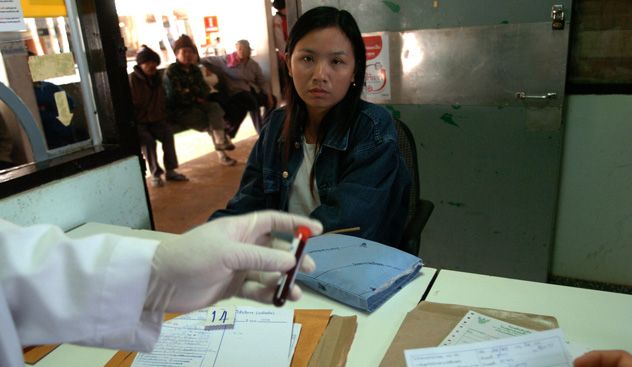

Existing discriminatory laws, policies and practices as well as negative attitudes among health practitioners are some of the main obstacles impeding access to health services for many people including people living with HIV, undocumented migrants, transgender persons, and persons with disabilities. Credit: UNAIDS/O.O’Hanlon
Feature Story
Overcoming discriminatory barriers to health services
14 March 2014
14 March 2014 14 March 2014Existing discriminatory laws, policies and practices as well as negative attitudes among health practitioners are some of the main obstacles impeding access to health services for many people.
This is one of the main conclusions coming out of a debate convened by UNAIDS on 11 March to explore how discriminatory barriers to health services affect different population groups including people living with HIV, undocumented migrants, transgender persons, and persons with disabilities.
For migrant people discrimination often starts at the point of departure, where pre-departure regulations can include mandatory testing for HIV, pregnancy and other health issues. To avoid these tests, migrants may opt for irregular channels of migration, thus becoming undocumented and unable to access health services.
For transgender persons, discrimination is embedded in the International Classification of Diseases, which considers transgender as a mental illness. In many countries, including more than 20 in Europe, transgender people are forced to go through sterilization before gender reassignment surgery in order to change their gender identity.
Speaking about the possible lack of understanding about transgender issues among the medical profession, Mauro Cabral from the Global Action for Trans Equality (GATE) stressed that, “ignorance cannot be an excuse anymore. Doctors must respect, and not judge, patients.”
Another common barrier identified was the perception among the general population in many countries that resources invested in health services are ‘wasted’ on such groups which many in society consider ‘less deserving’.
Monitoring and documenting discrimination was stressed as a strategy to generate evidence to address the problem. In this regard, the Stigma Index and Human Rights Count were highlighted as tools which have been successfully used to monitor discrimination against people living with HIV. For example, the Human Rights Count tool, revealed the practice of involuntary sterilizations of women living with HIV.
“When communities are given the space and opportunity to engage in human rights monitoring, the real obstacles of why people are not accessing health services can be identified and addressed,” said Chris Mallouris, community mobilization adviser at UNAIDS. “We must ensure that communities are at the centre of efforts to address discrimination. They must be there as equal partners,” he added.
The panel debate concluded with a sobering recognition of the long journey ahead to achieve zero discrimination. Participants recognized that action needs to be scaled up to overcome barriers to health services and that no one should be left behind if global health targets are to be achieved.



